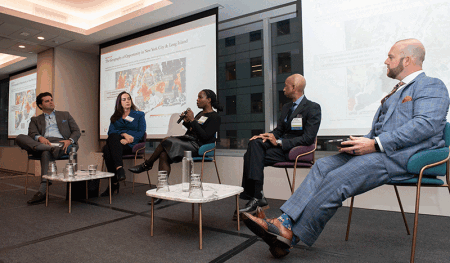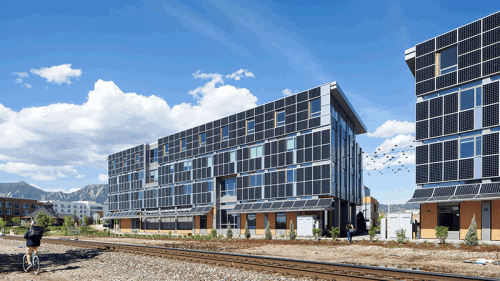In mid-January, ULI New York convened three panels of top real estate experts to unpack local real estate trends for 2023.
The sessions were kicked off by a presentation of Emerging Trends in Real Estate® United States and Canada 2023 by Ricardo Ruiz and Bill Staffieri, both partners at PwC, who also served as moderators.
The presenters highlighted the growing opportunities in real estate across the country as the market normalizes after pandemic-fueled market distortions.
The first panel included Colleen J. Wenke, president and chief operating officer, Taconic; Onay Payne, managing director of real estate, Lafayette Square; and James H. Simmons III, CEO and founding partner, Asland Capital Partners. The group shared their perspectives on key trends shaping the U.S. real estate industry.

On stage at ULI New York Real Estate Outlook 2023 in New York City. Ricardo Ruiz, partner, PwC; Colleen J. Wenke, president and chief operating officer, Taconic; Onay Payne, managing director of real estate, Lafayette Square; James H. Simmons III, CEO and founding partner, Asland Capital Partners; and Bill Staffieri, partner, PwC. (ULI New York)
Despite an “uncertain horizon” for the future of real estate in a post-pandemic world, panelists agreed that one hallmark of the city’s economy is its capacity for resilience and growth.
The panel drilled down on the future of office and ESG—including impact investing and affordable housing. Here are a few key takeaways:
Wenke: “Highly amenitizing our office space is certainly something that has come about… People want a purpose to be back in the office, whether it’s two days a week, three days a week, five days a week, whatever fits your company and culture and drives the engine of your business.”
Payne: “The reality is, in New York, the majority of the dollars that are channeled into affordable housing are highly aggregated and concentrated, in many respects, in areas of poverty. The data is not always clear as to how that helps individuals, but certainly, at least dollars are going in… You will not be surprised when I tell you that where you see these high levels of concentration [of affordable housing dollars], there is not a high level of socio-economic mobility. It’s doing work that needs to be done, but it’s not translating into higher levels of socioeconomic mobility.”
Simmons: “Looking at it big picture, there really are three areas in which the government is going to be focused over the next 10, 15, 20 years. One is infrastructure, which the bill just passed. The other is affordable housing, which you can pick up any newspaper in any large city, even in the suburbs [and] they’re saying that it’s an issue. And the third is in sustainability, environmental consciousness—so under the rubric of ESG. And if you look at the history of the country, there has not been an industry, which has not benefited from government either solving a problem or saying that this is our priority.”
The second panel was moderated by Julie Janiski, partner, Buro Happold, and included Anastasia Istratova, principal, climate tech, Fifth Wall; Lauren Brust Moss, senior vice president and chief sustainability officer, Vornado Realty Trust; Lauren Zullo, managing director, impact, Jonathan Rose Companies. The panel addressed the implementation of ESG in real estate.

Photo caption: On stage at ULI New York Real Estate Outlook 2023 in New York City: Julie Janiski, partner, Buro Happold; Anastasia Istratova, principal, climate tech, Fifth Wall; Lauren Brust Moss, senior vice Ppesident–chief sustainability officer, Vornado Realty Trust; Lauren Zullo, managing director, impact, Jonathan Rose Companies.
Tenant engagement, intentional data collection and reporting, and emerging and existing technologies are essential for sustainable building ownership and decarbonization of the built environment, shared the panelists.
Here are some key insights:
Istratova: “There’s been a huge volume of activity but very few tech solutions that can comfortably and reliably calculate and address scope three emissions…so that’s a huge area of near-term movement… [Embodied carbon] is something that people are starting to talk about, starting to calculate, but the reality is that the tech solutions to actually address embodied carbon – in particular, new construction – are still quite nascent. So [Fifth Wall] made an investment in a carbon-negative cement company… If the cement industry were a country, it would be the third-highest emitting country in the world. So just addressing that would be huge for the path to net zero.”
Brust Moss: “The concept of constant education for tenants is critical. We send them videos, we send them fliers, we put signs everywhere telling people what to do… [Vornado Realty Trust is] spending a lot of time on really specific alignment… Taking the data that we have and really looking at it and how it impacts our tenants and therefore us, as opposed to starting from [the building owner].”
Zullo: “[Jonathan Rose Companies is] trying to ensure that we’re not only going to meet the base requirements of ESG [from the SEC] but also that we have our measurement and metrics systems in place for delivering a positive impact on top of mitigation activities that we are doing.”
The final panel was a fireside chat focusing on DEI in the development of the next generation of real estate leaders moderated by, Julia Sweeney, Managing Director, Leadership Consulting, Ferguson Partners, and included Stephen Rosenberg, Founder and Executive Chairman, Greystone; Mary Hogan Preusse, Board of Directors, Realty Income Corporation, Host Hotels and Resorts, Digital Realty, Kimco Realty Corporation and Senior Advisor, Fifth Wall; and Cedric Bobo, CEO and Cofounder, Project Destined.

On stage at ULI New York Real Estate Outlook 2023 in New York City: Stephen Rosenberg, founder and executive chairman, Greystone; moderator Julia Sweeney, managing director, leadership consulting, Ferguson Partners; Mary Hogan Preusse, board of directors, Realty Income Corporation, Host Hotels and Resorts, Digital Realty, Kimco Realty Corporation, and senior advisor, Fifth Wall; and Cedric Bobo, CEO and cofounder, Project Destined.
The panelists shared industry-wide opportunities for identifying, educating, and inspiring a diverse next generation of real estate professionals. Additionally, the panelists acknowledged the importance of diverse management and creating a company culture that is completely committed to DEI.
Here are some key insights:
Rosenberg: “What you have to do is soak the content in DEI. You can’t have just a DEI initiative here and there so that you can check the box… I want to be a model for other companies to learn that you can be extraordinarily profitable and that you’re not at all sacrificing profitability, just to the contrary.”
Hogan Preusse: “It is so great to find people just like you that you can network with in your own way. And it really pays dividends down the road career-wise and so I highly encourage getting involved.”
Bobo: “For me, it’s about going to the far reaches of the world to find great talent and get them excited about our sector because it’s brilliant.”
More on these topics:


